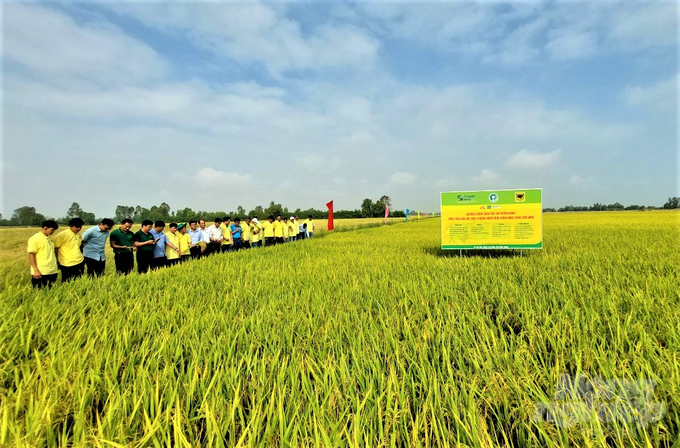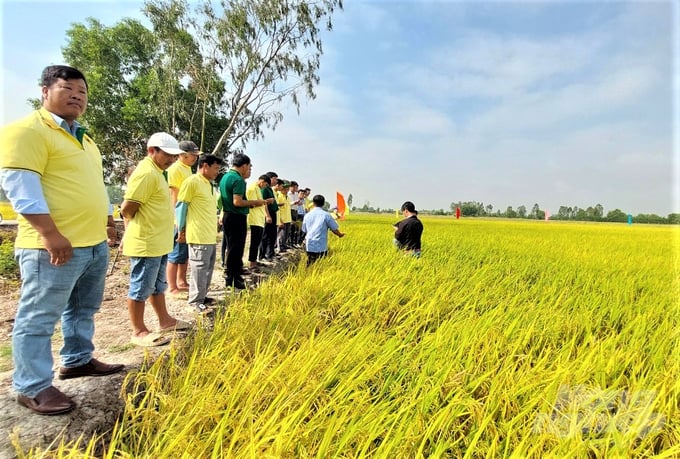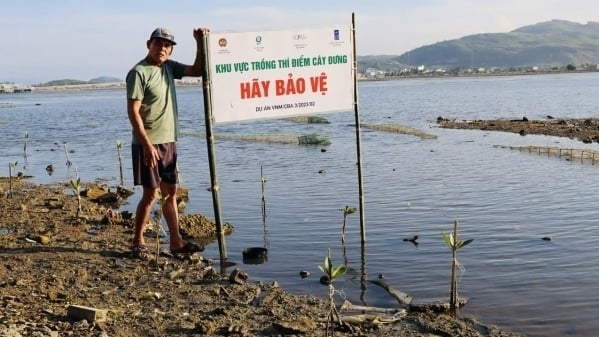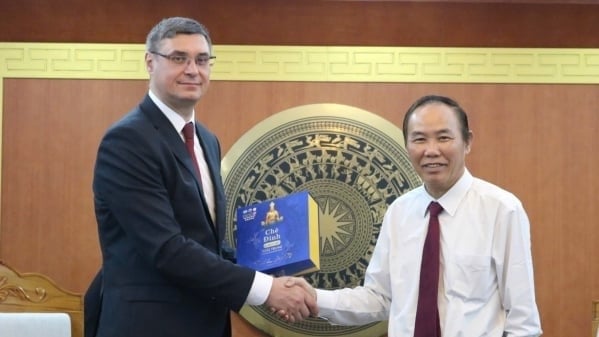May 21, 2025 | 16:03 GMT +7
May 21, 2025 | 16:03 GMT +7
Hotline: 0913.378.918
May 21, 2025 | 16:03 GMT +7
Hotline: 0913.378.918
Binh Dien JSC and the Kien Giang Provincial Agricultural Extension Center have collaborated to organize a workshop that will summarize the smart and low-carbon rice cultivation model associated with green growth in the Mekong Delta for the winter-spring crop of 2023-2024. The model was carried out on a 2.3 ha area in Phu Hoa hamlet, Tan Hoi commune, Tan Hiep district, Kien Giang province, which included a 1 ha control.

The smart rice cultivation model with low emissions associated with green growth in the Mekong Delta applies integrated technical solutions from various enterprises, helping to reduce costs and increase profitability. Photo: Trung Chanh.
According to Dr. Le Van Dung, Deputy Director of the Kien Giang Provincial Agricultural Extension Center, the model utilized the VINARICE-verified Dai Thom 8 rice variety and implemented cluster sowing using a cluster rice sowing machine supplied by Sai Gon Kim Hong Trading Services Co.Ltd. Each hectare received 60 kilograms of rice seeds, a reduction of more than 50 seeds sowing compared to the farmers' traditional practice of sowing 120 to 150 kilograms of seeds.
The model utilizes specialized fertilizers manufactured by Binh Dien Fertilizer Joint Stock Company for the purpose of rice maintenance. The smart rice cultivation model involves the application of basal fertilization with 50kg/ha of Dau Trau Salty- Lime fertilizer and three rounds of topdressing three days prior to seeding. In contrast, farmers in the control plot apply fertilizer in four rounds per crop. The model implements insect management in accordance with Bayer Vietnam Limited's Much More Rice method. The absence of pesticide application and routine field inspections by the farmers in the model leads to a reduction in the prevalence of pests and diseases during the initial forty days following cultivation.
As per Mr. Ho Van Huong, a farmer involved in the model, there is not a significant difference in the quantity of nitrogen fertilizer applied. However, the model exhibits elevated levels of phosphorus, potassium, and micronutrients in comparison to the control plot. These nutrients facilitate more balanced rice plant development, render the plants more resistant to pests and diseases, and enhance their capacity to endure lodging. The model's pest management adheres to the company's recommendations under the supervision of experts, which reduces costs per hectare by more than 2.8 million VND and results in fewer pesticide applications for disease and pest control.
In Kien Giang's Mekong Delta, the intelligent rice cultivation model characterized by low emissions and green growth has furnished farmers with adaptive production strategies to confront the present obstacles in rice cultivation. Furthermore, it promotes sustainable agricultural development, safeguards the environment, reduces expenses, increases productivity, enhances crop quality, and improves profitability while facilitating access to new technological advances in rice cultivation.

The model helps reduce production costs, increase productivity, and achieve higher rice quality, resulting in an additional profit of VND 3.8 million per hectare. Photo: Trung Chanh.
According to Mr. Le Van Dung, Deputy Director of the Agricultural Promotion Center in Kien Giang, it is crucial to sustain the implementation of the model for three consecutive seasons annually at each location in order to evaluate productivity, ecological transformations in the vicinity, soil enhancement, and the formulation of season-specific recommendations, despite the initial model's encouraging results.
In the forthcoming period, Binh Dien Fertilizer Joint Stock Company must persist in showcasing a diverse range of models. By concurrently administering varying quantities of fertilizer based on the season and region, one can maximize the efficiency of fertilizer usage.
Farmers who utilize cluster seeding machines supplied by Saigon Kim Hong Trading Services Company are able to reduce their seed consumption from 150kg/ha to 60kg/ha during the seeding procedure. Cluster fertilization increases rice yield by fostering robust plants with enhanced resistance to lodging and decreased susceptibility to pests and diseases. The use of machines to seed rice in clusters signifies a technological progression that necessitates support and progressive implementation in rice cultivation to supplant the conventional broadcasting technique.
The intelligent rice cultivation model produced a harvest of 8.4 tons/ha, an increase of 0.3 tons/ha in comparison to the control plot. The profit has augmented by an additional 3.8 million VND per hectare as a result of decreased production expenses and enhanced rice quality-driven yield.
Translated by Linh Linh

(VAN) The swamp in Pho Thanh is gradually being covered with red mangrove, creating a favorable environment for producing clean, high-quality salt.

(VAN) The trade turnover of agro-forestry-fishery products is growing significantly, along with investment cooperation commitments that are opening up new development directions between Vietnam and Russia.

(VAN) Khanh Hoa is investing over 545 billion VND to develop 240 hectares of high-tech marine aquaculture in order to guarantee a consistent supply of seafood exports and achieve the USD 1 billion target.

(VAN) Minister of Agriculture and Environment Do Duc Duy held a meeting with Soopakij Chearavanont, Chairman of C.P. Group, on May 15.
/2025/05/16/3800-0-nongnghiep-143756.jpg)
(VAN) Suntory PepsiCo Vietnam coordinated with the Ministry of Education and Training to implement an education program on water conservation, reaching nearly 1 million primary school students nationwide.

(VAN) Vietnam’s TH Group officially put its high-tech fresh milk processing plant into operation in the Russian Federation, marking a historic moment as the first TH true MILK cartons were produced in Russia.

(VAN) Use of high-quality broodstock and biotechnology is regarded as the most effective approach to ensuring sustainable and economically viable shrimp aquaculture ahead of climate change and the emergence of increasingly intricate disease patterns.